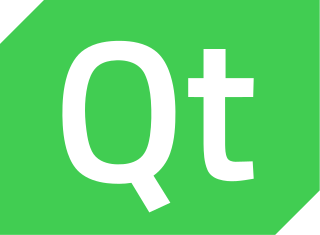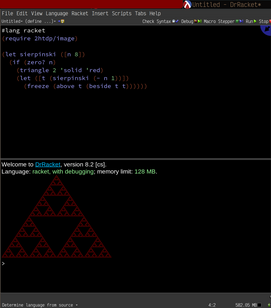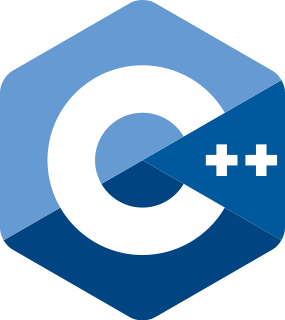
Qt is a free and open-source widget toolkit for creating graphical user interfaces as well as cross-platform applications that run on various software and hardware platforms such as Linux, Windows, macOS, Android or embedded systems with little or no change in the underlying codebase while still being a native application with native capabilities and speed. Qt is currently being developed by The Qt Company, a publicly listed company, and the Qt Project under open-source governance, involving individual developers and organizations working to advance Qt. Qt is available under both commercial licenses and open source GPL 2.0, GPL 3.0, and LGPL 3.0 licenses.
Templates are a feature of the C++ programming language that allows functions and classes to operate with generic types. This allows a function or class to work on many different data types without being rewritten for each one.
In computer science, a preprocessor is a program that processes its input data to produce output that is used as input to another program. The output is said to be a preprocessed form of the input data, which is often used by some subsequent programs like compilers. The amount and kind of processing done depends on the nature of the preprocessor; some preprocessors are only capable of performing relatively simple textual substitutions and macro expansions, while others have the power of full-fledged programming languages.
Template metaprogramming (TMP) is a metaprogramming technique in which templates are used by a compiler to generate temporary source code, which is merged by the compiler with the rest of the source code and then compiled. The output of these templates include compile-time constants, data structures, and complete functions. The use of templates can be thought of as compile-time execution. The technique is used by a number of languages, the best-known being C++, but also Curl, D, and XL.
Programming languages can be grouped by the number and types of paradigms supported.
The C preprocessor or cpp is the macro preprocessor for the C and C++ computer programming languages. The preprocessor provides the ability for the inclusion of header files, macro expansions, conditional compilation, and line control.
Metaprogramming is a programming technique in which computer programs have the ability to treat other programs as their data. It means that a program can be designed to read, generate, analyze or transform other programs, and even modify itself while running. In some cases, this allows programmers to minimize the number of lines of code to express a solution, in turn reducing development time. It also allows programs greater flexibility to efficiently handle new situations without recompilation.

PyQt is a Python binding of the cross-platform GUI toolkit Qt, implemented as a Python plug-in. PyQt is free software developed by the British firm Riverbank Computing. It is available under similar terms to Qt versions older than 4.5; this means a variety of licenses including GNU General Public License (GPL) and commercial license, but not the GNU Lesser General Public License (LGPL). PyQt supports Microsoft Windows as well as various flavours of UNIX, including Linux and MacOS.

Racket is a general-purpose, multi-paradigm programming language based on the Scheme dialect of Lisp. It is designed to be a platform for programming language design and implementation. Racket is also used for scripting, computer science education, and research.
libsigc++ is a C++ library for typesafe callbacks.
QtScript is a scripting engine that has been part of the Qt cross-platform application framework since version 4.3.0.
qmake is a utility that automates the generation of makefiles. Makefiles are used by the program make to build executable programs from source code; therefore qmake is a make-makefile tool, or makemake for short.
QML is a user interface markup language. It is a declarative language for designing user interface–centric applications. Inline JavaScript code handles imperative aspects. It is associated with Qt Quick, the UI creation kit originally developed by Nokia within the Qt framework. Qt Quick is often used for mobile applications where touch input, fluid animations and user experience are crucial. QML is also used with Qt3D to describe a 3D scene and a "frame graph" rendering methodology. A QML document describes a hierarchical object tree. QML modules shipped with Qt include primitive graphical building blocks, modeling components, behavioral components, and more complex controls. These elements can be combined to build components ranging in complexity from simple buttons and sliders, to complete internet-enabled programs.
Nemerle is a general-purpose high-level statically typed programming language designed for platforms using the Common Language Infrastructure (.NET/Mono). It offers functional, object-oriented (OO) and imperative features. It has a simple C#-like syntax and a powerful metaprogramming system. In June 2012, the core developers of Nemerle were hired by the Czech software development company JetBrains. The team is focusing on developing Nitra, a framework to implement extant and new programming languages. This framework will likely be used to create future versions of Nemerle.
Dart is a general-purpose programming language originally developed by Google and later approved as a standard by Ecma (ECMA-408). It is used to build web, server, desktop, and mobile applications.

Mono is a free and open-source project to create an Ecma standard-compliant .NET Framework-compatible software framework, including a C# compiler and a Common Language Runtime. Originally by Ximian, it was later acquired by Novell, and is now being led by Xamarin, a subsidiary of Microsoft and the .NET Foundation. The stated purpose of Mono is not only to be able to run Microsoft .NET applications cross-platform, but also to bring better development tools to Linux developers. Mono can be run on many software systems including Android, most Linux distributions, BSD, macOS, Windows, Solaris, and even some game consoles such as PlayStation 3, Wii, and Xbox 360.

Nim is an imperative, general-purpose, multi-paradigm, statically typed, systems, compiled programming language designed and developed by Andreas Rumpf. It is designed to be "efficient, expressive, and elegant", supporting metaprogramming, functional, message passing, procedural, and object-oriented programming styles by providing several features such as compile time code generation, algebraic data types, a foreign function interface (FFI) with C/C++ and compiling to C, C++, Objective-C and Javascript.







